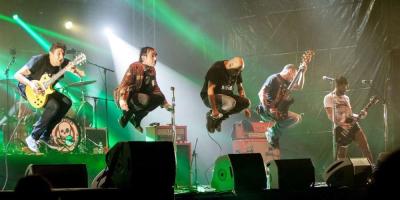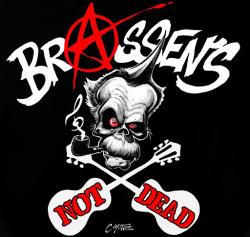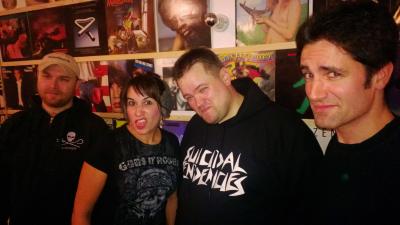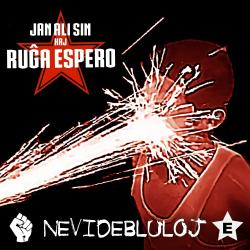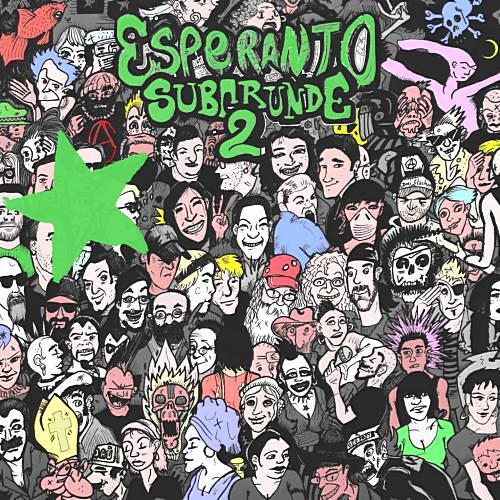
Double album ref.: VKKD135-083AB
Double CD A/B (Disc A, 25 titles, 57:45 mn / Disc B, 24 titles, 56:28 mn)
Available in MP3 – 320 Kb/s - OGG and CD formats
ESPERANTO SUBGRUNDE 2 - International compilation
Co-produced the bands and Vinilkosmo © 2022
Please note: ** The complete album is also available in the following digital formats by clicking on the desired format:
OGG , FLAC or Streaming (MUZIK-KLUBO).
Contact us to order individual tracks for download in mp3 or other format.
Official release of the international digital compilation & double CD on 18 march 2022
Here is the highly anticipated new punk rock compilation Esperanto Subgrunde vol.2 with 49 songs in Esperanto !
The double album features twenty-three groups from eleven countries.
The first extreme rock groups that started writing songs in Esperanto appeared in the late 1980s and early 1990s. At the same time, the Esperanto music label Vinilkosmo was founded in France. Since the 1990s there has been a small amount of underground musicians supporting the international language in Brazil, Poland, France, Russia, Ukraine, Japan, and in groups scattered throughout other countries.
In 2000, Vinilkosmo in co-production with the Brazilian label La Blua Papilio released the first volume of an international Esperanto compilation Esperanto Subgrunde.
In March 2022, the second volume of this significant double album is being released. The compilation will include recent songs specially recorded for this edition, and old rediscovered songs with restored sound. Groups of different countries and nationalities are united here not only by musical genres and language, but also by the ideals of Esperanto.
Esperanto is the planned neutral international language with a simple grammar that can be learned ten times faster than any natural language. It was created in 1887 to facilitate communication between people.
“Esperantokoro” is an unofficial term for all underground rock music with lyrics in Esperanto; it’s rock music against linguistic discrimination and inequality, against racism and fascism, against imperialism and cultural chauvinism, against sexism and social injustice, against war and the barriers between people.
We choose freedom, world peace, and communication between peoples without barriers!
The compilation supports the alternative and united educational project of “La Escuelita” set up by three teachers from the Franco-Peruvian Institute in Lima. It aims to carry out educational and academic support activities for children living in the slums located in the highlands of Lima not having access to virtual online courses since the start of the coronavirus pandemic.
Project details of La Escuelita (in spanish).
Presentation in Esperanto of La Escuelita here.
Participating groups:
Ale kaj Arrach (Argentina and France, punk hardcore), Brassens Not Dead (France, anarcho-punk song), Corbata (Japan, grindcoro), Drei Flaschen (Germany, punk), Eveline Paŭla (Brazil, Punk rock), Fikiĝu (Brazil, grindcore), Frakasu (Russia, punk hardcore), Jan Ali Sin (Russia, electro-punk) JoMo kaj Liberecanoj (France, anarcho-punk rock), Krio De Morto (Poland, industrial punk), La Bleka Forfikulo kaj Siaj Orelboristoj (France, garage rock), Manifesto Jukebox (Finland, punk), Pendumito (Poland, punk hardcore), Penis Canina (Russia, grindcore), Piĉismo (Ukraine/Lithuania, punk hardcore), Pixamandúrries (Catalonia, rural punk), Platano & Sparky Riot (France, ska punk), René Binamé (Belgium, anarcho-punk song), Rezistanco (Russia, punk hardcore), Ruĝa Espero (Russia, garage rock), SocialZero (Russia, punk hardcore), Stomachal Corrosion (Brazil, grindcore), Tiu Ne Gravas (Argentina, garage rock, alternative stoner rock).
Presentation of BANDS on ESPERANTO SUBGRUNDE 2
(International compilation)
1- Ale kaj Arrach
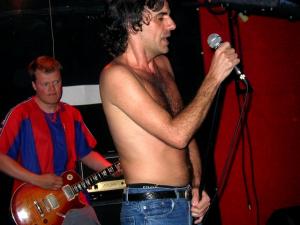
The Argentine Ale Kosabela surprised us in 1988 when he first appeared in Kolekto 2000 on the first post-punk-rock album of La Porkoj…
He returns with this song "Bestoj fiaj", which he sang to the music of the punk-hardcore band from Toulouse, Arrach, and thus contributes to the compilation Esperanto Subgrunde 2.
About Ale Kosabela here!
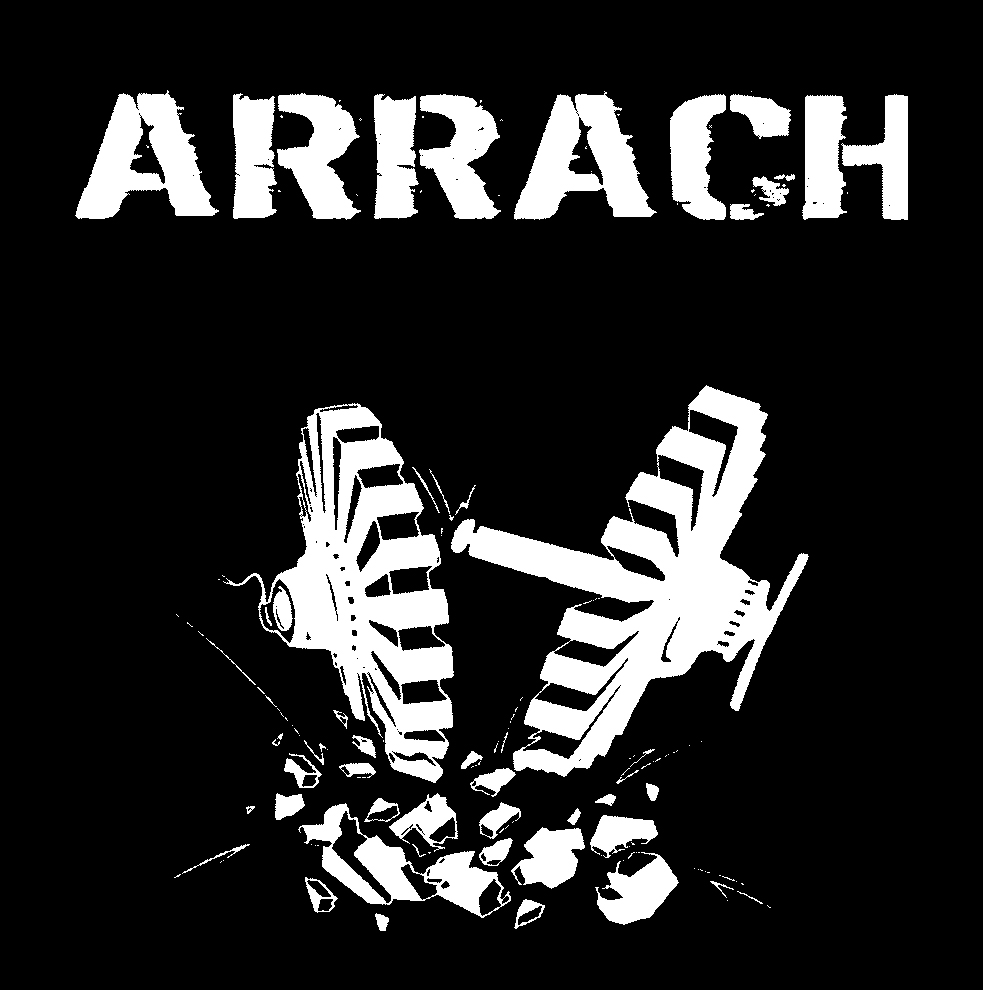
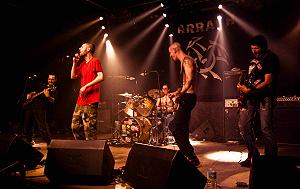
Arrach has been around since June 2002 and debuted in a hardcore punk style.
A 5-track demo was quickly recorded in December 2002 to promote the group, and dates began to follow in France.
The band has recorded several albums and also participated in a dozen compilations such as "Haute tension", "Punk en France", "20 ans of Radical Antifascism" between 2004 and 2012.
Currently Arrach has performed more than 200 concerts throughout France and also in Germany, Belgium , Netherlands, Denmark, Norway, Sweden, Spain, Italy, and in Morocco with bands on stage like GBH, Soziedad ALkoholika, Parabellum, Human Alert, Oberkampf, Leftover Crack, Born Dead, Body Bag, Les Amis d'ta femme, Brassen's Not Dead, Les Apaches, Lower Class Brats, Black Bomb A, Trepalium, Offending, Condkoi, Skunk, l'Enfance Rouge, Burning Heads, Les Ramoneurs de Menhirs, Heyoka.
From 2015 and after various changes, the group resumed with 4 musicians, now tuned in "re" with a revised musical orientation of Hardcore Trash...
In Arrach there are ex-musicians from the former band Arrach Moumout who participated in the first volume of Esperanto Subgrunde.
http://arrachpxhc.free.fr/
https://www.hardcore-punk.net/groupe/409/arrach
2- Brassens Not dead (Brassens Ne Mortis)
Brassens Not Dead is a French anarcho-punk rock band from Toulouse, France.
It was created in 2006 to revive the memory of Georges Brassens, reinterpreting his songs in Punk versions, preserving the humor and the spirit of protest.
The musicians, originally from the punk movement of the 1980s and 1990s (Les Sheriff, les Valseuzes, Trashbug, etc.), all have solid musical experience and share a communicative enthusiasm for Georges Brassens' lyrics.
For this compilation, Brassens Not Dead takes the translations that were made for Jacques Yvart's first Esperanto album.
http://www.punk-rock.fr/biographie%20brassens/biographie%20brassens.htm
3-Corbata (Kravato)
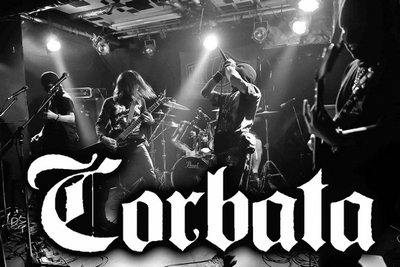
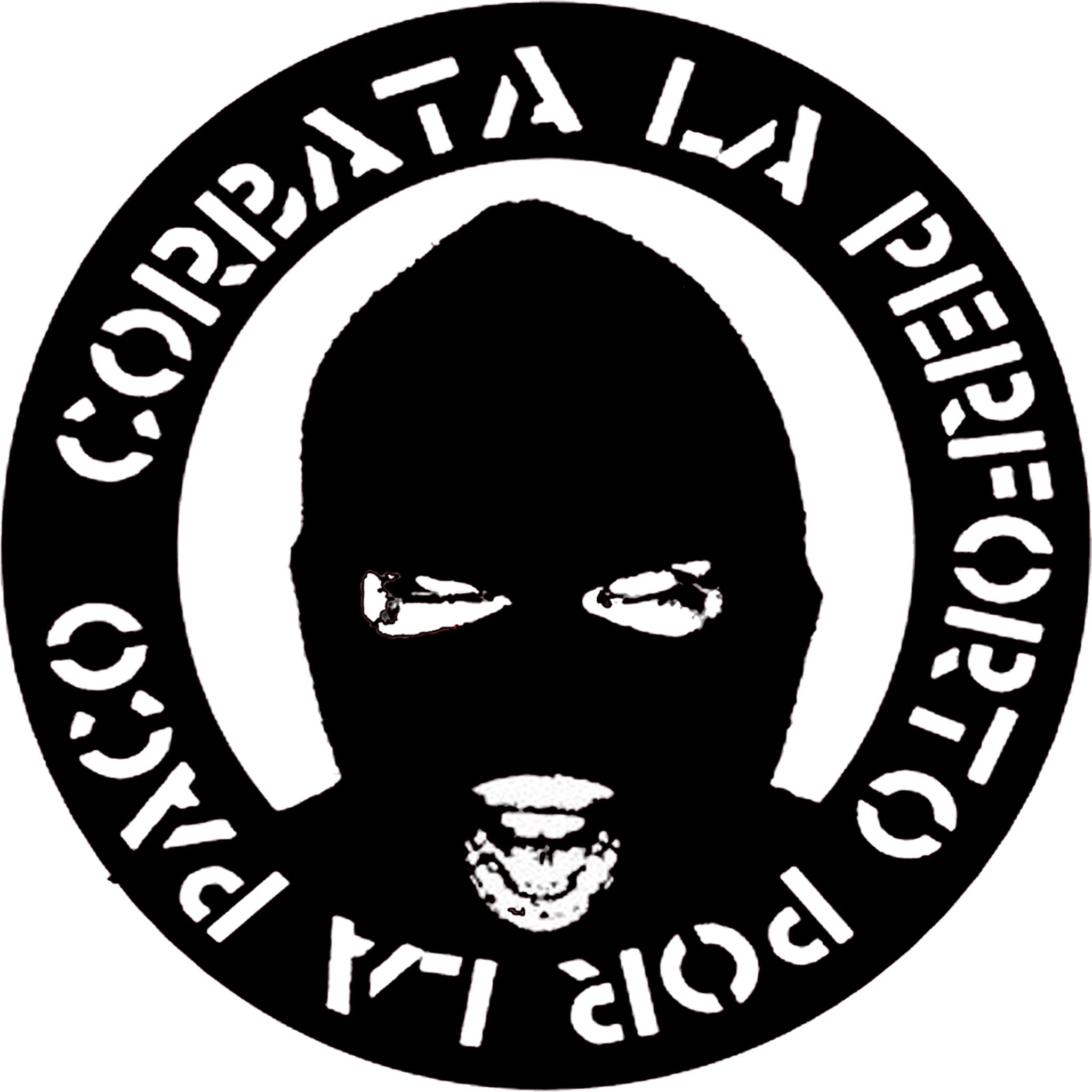
Corbata, Japanese grindcore band from Tokyo, Japan
Voice: Pirate
Guitars: Yuu
Drumo: Matsu
2011: begining of the band
2012: release of the first demo
2013: -GRIND ON THE DOORSTEP !!! KD, -GRINDBASTARDS vol.7, -A ROAR OF INDIGNATION LD (LP)
2014: -4way EP, -Divin wind ep, -Global grindcore compilation SLAVE to the GRINDCORE
2015: GRINDBASTARDS vol 9
dec. 2016: -1st LD album by Corbata [IN THE NOISE], CD shared Corbata with O.G.D [A TOUCH OF THE BLAST]2018: 2nd CD of Tie [An Endless Hate]
https://timeline0516.wixsite.com/corbata
4- Drei Flaschen (Tri boteloj)
Drei Flaschen is a German punk rock band from Berlin. Founded in 1995 as a purely fun project under the name Drei Flaschen in'na Plastiktüte, the three Berliners were invited to their first concert as the first part of The Exploited.
Later other musicians were added.
https://dreiflaschen.com/
With the kind permission of ROADSHOCK (Berlin)
5- Eveline Paŭla

Eveline Paula is a Brazilian Esperantist who writes songs in Portuguese and Esperanto.
She likes to make good songs that touch the mind and the heart and also move the body.
Eveline Paula graduated in pedagogy and is now studying Literature.
About the song «Kiu mi estas?» Eveline says: I am very grateful to Julio Caligari who suggested I compose punk rock music, and to his daughter Marianna who inspired the melody for me with her song "Morceguinhos".
I listened to some punk rock songs and I thought this new song should be about something more intimate. Writing the song I felt a duality in my heart like I was good and bad at the same time, and I also remembered people who told me who I was and what I should be and think.
... and this is how this song was born.
Text and music: Eveline Faria Fernandes de Paula
Singer: Eveline Paŭla
Score: Valéria Caffaro
Review: Angela Faria
Arrangement and music recording: Rafael Milhomem
6- Fikiĝu
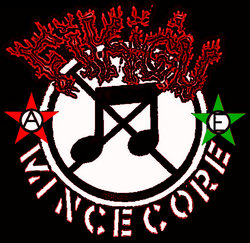

Fikiĝu is a mincecore brute band from Brazil (São Paulo region).
Mincecore is a music genre based on grindcore with sociopolitical lyrics.
It is a crude and minimalist form of grindcore.
Their first and only album Atako Sona was released in April 2014 at Bandcamp.
Kreb: guitar, drums, vocals
https://fikigxu.bandcamp.com/album/atako-sona
7- Frakasu
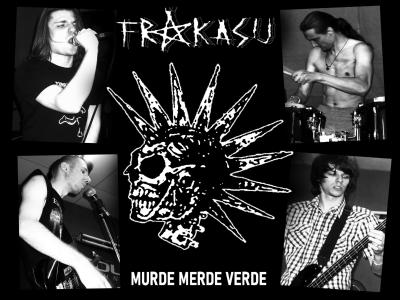
The band Frakasi was formed in early 2010 in Ivanovo, Russia, by Vladimir, also known as Jan Ali Sin, when he and his friends began rehearsing and recording domestic demo songs. The initial intention was to play hardcore 50/50 in Russian and Esperanto.
Stable membership only came in 2012: Vladimir - vocals, Bob - guitar, Mikhail - bass and Denis - drums.
In the spring of 2012 the band started performing.
During the year, about half a dozen DIY gigs took place at various underground venues in Ivanovo and Moscow - rock clubs, rehearsal bases and squats. During the last concert Frakasi played in one scene with popular punk band Purgen, after that concert Vladimir decided to disband his group.
In addition to playing in Frakasi, Vladimir recruited for Esperanto among Russian punk musicians and distributed homemade CDs with Esperantocore music.
That's why he was inspired to record tracks in Esperanto with some other Russian punk bands - "SocialZero", "Rezistanco", "Skverna", and started collecting material for the new Esperanto compilation.
In the summer of 2021 Vladimir relaunched the band with a fresh membership by slightly changing the name of the group to Frakasu.
https://vk.com/frakasu
https://frakasu.bandcamp.com
8- Jan Ali Sin & Ruĝa Espero
In the spring of 2021, Jan from the band Frakasu (then not reformed) met Alexei from the Petersburg (Russian) group Ruĝa Espero.
Jan showed Alex his newly written songs. Alexei immediately offered to record something together, and chose an outline of Jan's song "Nevidebluloj".
Alex arranged the music and played all the instruments, and Jan sang.
Jan Ali Sin is also developing a solo punk electro project with his debut album « Punk’ ne mortis ».
9- JoMo kaj Liberecanoj
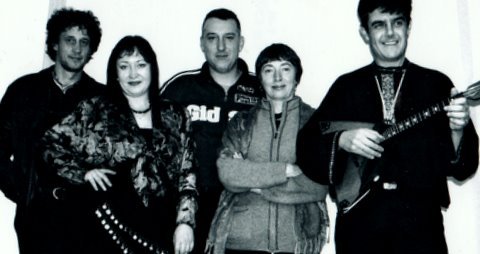
This band was formed in 1998 on the occasion of the recording of the album in honor of the anarchists in Spain in 1936 and the Ukrainian anarchists of the Machnovshchina.
Pure anarcho-punk rock album in Esperanto.
At the end of September 2021, especially for the compilation Esperanto Subgrunde 2, JoMo rewrote and sang again in Esperanto "Al la barikadoj" and re-recorded the anarchist song with the help of Thierry Viguier who made the new musical arrangements, played guitar, and recorded and mixed in his own sound studio in Montauban.
For the other songs "Kun ci" and "Makhnovshchina" are:
JoMo (J. M. Leclercq): voice, bass
Poej (Pierre Bertrand): guitar
Gerardo: Drum
Studio: Studio Stansy (Toulouse)
Sound engineers: Jean Louis Parre and Max Bale
To watch the music video: "Maĥnovŝĉino"
About the Liberacanoj: https://parapet.pagesperso-orange.fr/punkaotique/Libertarios/libertarios.html
About JoMo here!
10- Krio de Morto
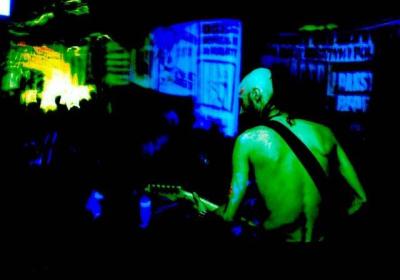
Krio de Morto from Poznań, Poland (now Glasgow-Poznań).
Started as a simple anarchic punk band in 1986. Fast forward to hardcore and even crossover, as one member liked metal music too much.
Later the band started playing a modern version of punk music and added theatrical performances.
Its new current music mixes elements of industrial music, metal, electronics, and evolves into a style that the band describes as "death dance".
- Gregor van Glapson: guitar, vocals, synthesizer, drums, samplers
- Tomasz "Fragles" Rajewicz: guitar, synthesizer, drums, samplers, backing vocals
- Christina Spook: bass guitar, female choirs
- Wojciech "Wosiu" Kuszewski: Bass guitar, backing vocals
https://www.facebook.com/kriomorto
More About Krio de Morto here !
11- La Bleka Forfikulo kaj Siaj Orelboristoj

One fine day in the Autumn of 1987 (?) I met an indescribable creature in the charming village of Fontetoj, quite south of Esperantoland. In fact, that creature was much more human than my words might suggest. First, because only human beings with a true heart can speak Esperanto. And he spoke in Esperanto! A raw Esperanto, of course, an occasional wrong Esperanto, but Esperanto nonetheless!
He introduced himself to me as being La Forfikulo (the Fucker Off)! Because he wanted to fuck out of our world every bastard who pollutes it! Before being an Esperantist, he was a rocker. And with a sharp rock he thought to reach his goal.
In that blessed time, he had just met with other rock lovers and was looking for a place that could withstand loud rock music! That's exactly what I had at the time, a place where the then unknown French rock band Panique au Paddock was working on their own music. Wolfgang, their bandleader and regretted friend of mine, permitted La Forfikulo and his gang members to use the site.
Of course, it was necessary to define the scheduling, because obviously the two bands could not play at the same place. In fact, there was no real impossibility there and in the end it turned out to be much easier than we feared!
The real problem was that the new Esperanto rock band was much noisier than the French one. La Forfikulo really bored out our poor ears. When I pointed this out to him, instead of grumbling rudely or burning angrily, his face calmed down and lit up with a joyful smile that not even the mildest angels would be able to.
That left me speechless, speechless, completely speechless, my eyes growing like two round loose.
"You are Genius", he suddenly exclaimed, "Thank you very much!"
Suddenly I felt liquid, as if I had become the most edible, the most edible, and finally the most edible verses of four rondelles by Rabelais talking about mountains of custards! Maybe the fact that he did say "Genius", with a capital and no article, and not "a genius", as I would have expected, may have led to my stupidity.
Maybe, too, I saw myself, later, spending many hours explaining the subtle difference to him. "Genius" can be a kind of divine being or a fabulous creature, such as a genie coming out of an oil lamp when it is rubbed, as in the accounts of "A Thousand and One Nights". "Genius" is also the mental ability to invent extraordinary creations. While "a genius" is only the guy who is capable of that Genius!
Just as suddenly understanding my misunderstanding, he explained: "You're a genius! You've just figured out the right name for our band!"
A time ... A time when not even the flies buzzed, a time during which even the quietest passing angels were completely silent and did not pass at all ... A great time after which I finally understood, feeling like flying on a pink cloud, that he really thought me a divine being, a being like his good genius genius, creating only for him his dearest desire!
"So we're going to be called La Bleka Forfikulo kaj siaj Orelboristoj.'
I will not tell you the tumultuous roaring noise that then exploded from the throats of the so-called Orelboristoj! The noise coming out of their musical instruments, however, was much more bearable. And only then did I stop flying, only then did I fall back to the ground ...
Unfortunately, I never knew where they came from or where they went off too. Maybe they went back to the past?
Maybe one fine Autumn day I'll hear them knock on my door?
Bertrando
12- Manifesto Jukebox
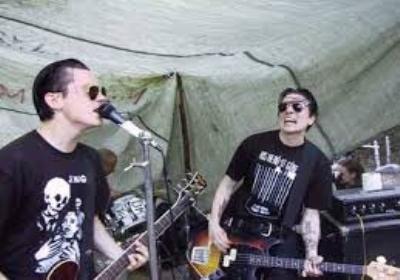
Manifesto Jukebox was a Finnish punk rock band that was active between 1998 and 2008. Their raw but melodic guitar-dominant sound and social commentary lyrics quickly caught the interest of the world-wide grassroots punk scene.
In the year 2000 the band released their debut album Desire, which became a classic in the genre.
During those studio sessions, the band also recorded an Esperanto version of the album's latest song: "I just smile when your plan falls apart".
After the release of the English-language album, Manifesto Jukebox toured extensively around Europe.
Their next album, Remedy, was released by the Los Angeles-based Better Youth Organization in 2002.
Tours followed in Japan, the United States, and Europe. Having achieved more or less everything on the self-production scene, the band became less active.
Manifesto Jukebox released one more album, Strain, in 2006 and disbanded in 2008.
The former members maintain their friendship and continue to randomly reactivate themselves for private events.
https://www.facebook.com/manifestojukebox
13- Pendumito
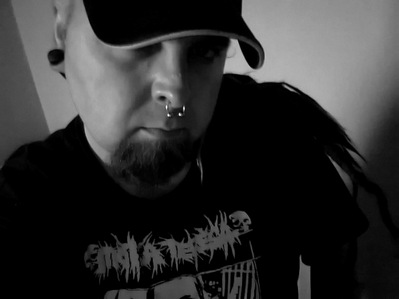

PENDUMITO is a punk-hardcore band from Poland that, in its work, tries to spread libertarian and pro-Esperanto ideas. The music was recorded in March-August 2003 and released independently by the band. PENDUMITO's music is a mix of fast and sharp crustal punk with elements of metal.
The band consisted of three musicians - Elvis, Szcsur and Lukas.
The main ideolog was Lukas, who played the guitar and wrote lyrics. His songs were in Polish and Esperanto - against capitalist politics and against the supremacy of the English language.
And the group fully supported the Esperanto movement among Polish undergrounders.
14- Penis Canina
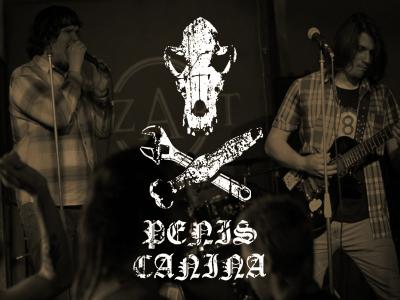
Penis Canina was founded in 2013 in Ivanovo (Russia).
The core members were: Vladimir (also known as Jan Ali Sin) - guitar (punk band Frakasi), Alexei - voice (noise projects "Noise Jihad", "Thermionic Emission" etc.) and Max - drum (grindcore band Death Before Revolution), but a number of concerts and recordings were played with additional musicians.
At first it was all chaotic noisecore with textless screams, but quickly it evolved into a raw grindcore with songs in various languages - German, Czech, Estonian, Swahili, English and Esperanto - because all the people were interested in languages and cultures; two of the members were Esperantists - Vladimir and Max.
Penis Canina broke up in 2014. During their activity the band released a number of noisecore splits and performed with Sete Star Sept (Japan), Bestial Vomit (Italy), I Know (Belarus), Kroveled, Pissdeads, and others.
https://vk.com/peniscaninanxc
https://soundcloud.com/penis-canina
15- Piĉismo
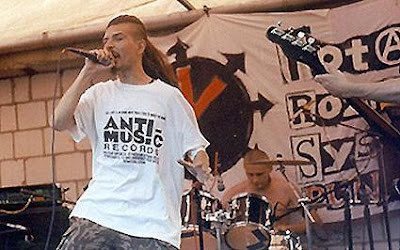
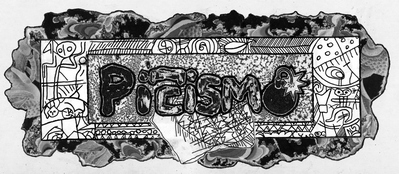
Piĉismo, is a Ukrainian punk rock band.
They call their genre "Esperantocore".
The group was formed in January 1993 in Tsiouroupynsk, southern Ukraine, by Gleb Maltsev (howls and ideology) and Roman "Malthus" Maltsev (guitar), Sergei Tarasevitch (other guitar).
Piĉismo has an extensive discography and a long history of changes in composition.
The group is led by Gleb Maltsev, who currently resides in Kaunas, Lithuania.
https://www.facebook.com/Pichismo-140486489392021
16- Pixamandúrries (Piŝamandurjes)
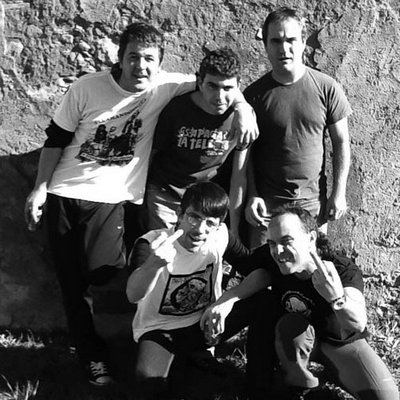
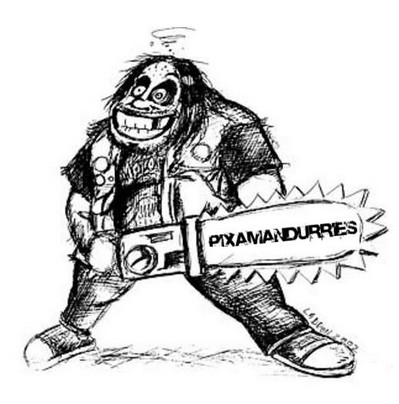
Pixamandúrries was a rural punk band from Empordà (Catalonia) from the late 80s, some of its members came from a group called Mioks with which they recorded a demo.
Pixamandúrries was active between 1989 and 1995. Throughout their career, they gave several concerts in Catalonia, Valencia, the Balearic Islands and also in France and Germany.
They released the album "Quina vida" (Picap, 1991), a self-produced demo entitled "L'any dels gossos" (1993) and the single "Tierra i Libertad" in support of the EZLN, edited by Captain Swing, Tralla Records and El Lokal, and songs in various compilations (among them Vinilkosmo-Kompil' Vol.1).
Pixamandúrries' last concert was in 1995. The last members of the group were Kinty (drums), Cuco (vocals, gralla and bongos), Xevi (guitar), Joni (bass) and Pine (guitar).
25 years later in 2020 the group reformed to record an album entitled "Dels rics i dels pobres" (The Rich and the Poor) published by Kasba Music SL, with the half Esperanto, half Catalan title « Tempiĝas Temp’ ».
https://www.facebook.com/pixamandurries.punkrural/
17- Platano & Sparky Riot (Platano kaj Sparka Ribelo)
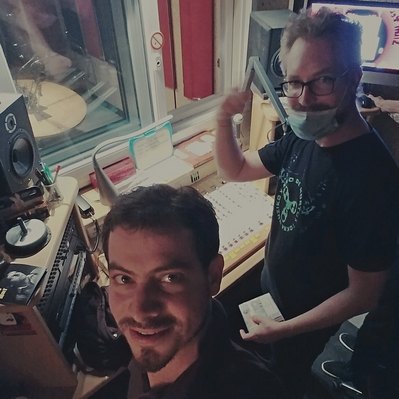
Platano (a former member of La Pafklik) partnered with Sparky Riot to record a ska-punk dub version of "Baldaŭ" for Esperanto Subgrunde 2.
Triboulet (a former member of Skawar) joined the project and brought additional music arrangements that punkized the song, and he masterfully remixed the whole thing…
«Baldaŭ», or how to have hope when the world seems to have no more.
Internationalists, Sparky Riot and Platano evoke battles around the world and the ability of peoples to open barriers of possibility. "Soon we will dance on the graves in the cemetery of the old world."
https://platano.bandcamp.com/
https://sparkyriot.bandcamp.com/
18- René Binamé (Renato Bonamato)
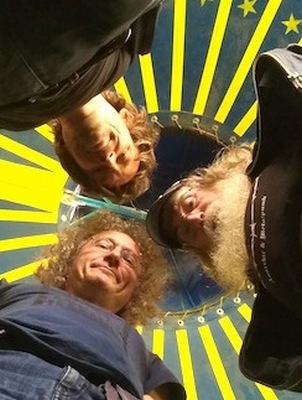
René Binamé is a Belgian group born in 1988.
They play anarcho-punk songs with incisive lyrics, nuanced by electro-sounds and with a free-punk trend.
René Binamé lets his engaged songs be transformed according to humor and atmosphere, into noisy poetic walks, into collective trances, hypnotic lullabies or ... into engaged, tender and fiery songs.
To watch the music video: "Fluas la viv'"
For the song "Julie 1936": With the kind permission of the Esperanto adaptation of the publishing house:
Edito-Musiques - Noir Coquelicot (Serge Utge-Royo)
http://www.aredje.net/rene-biname
19- Rezistanco
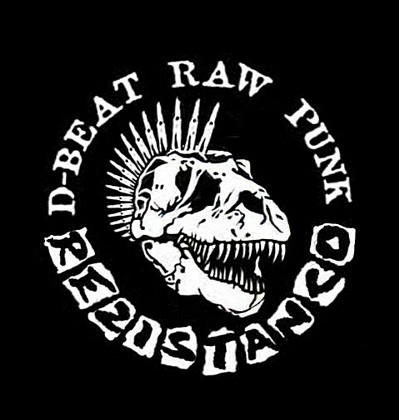
The band was founded in the autumn of 2010 in Tuchkovo (Russia) by the punks Diagen and Semyon.They were later joined by another student, Diagena Valkyrie.
Initially the band was called "Sekt (A)".
Shortly afterwards in 2011 the group decided to add an Esperanto choir to their repertoire, the name was translated into Esperanto and since then the band has been called Rezistanco.
Members of the band in different periods were ...
Diagen - song, bass, lyrics (since 2010)
Semyon - drums (2010-2012)
Valkyrie - guitar (2010-2011)
Rad Panther - backing vocals (summer 2011 - fall 2012)
Plumpinto - guitar (summer 2011 - March 2012)
Alex - guitar (March-April 2012)
Nataska Skapendra - drums (February - July 2012)
Mauser - guitar, backing vocals (July - December 2012)
Gnome - drums (August - December 2012)
Play - double bass, backing vocals (October - December 2012)
xEZHx - drums (since 2013)
Anonimus Z - guitar (November-December 2014)
Trava - guitar (since December 2014)
https://rezistancopunx.bandcamp.com/
20- Ruĝa Espero
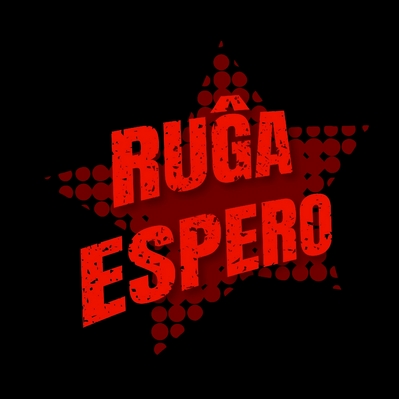
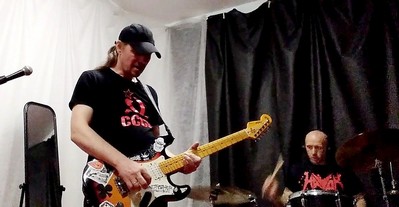
A punk-rock band from Leningrad that sings in Esperanto and Russian.
In Esperanto because it is neutral, in Russian because it is the language of the revolution.
Singing is a struggle against global capitalism, Marxism and anti-fascism.
The band is constantly changing, but the main character remains the same - Alexei Stslastiv.
21- SocialZero
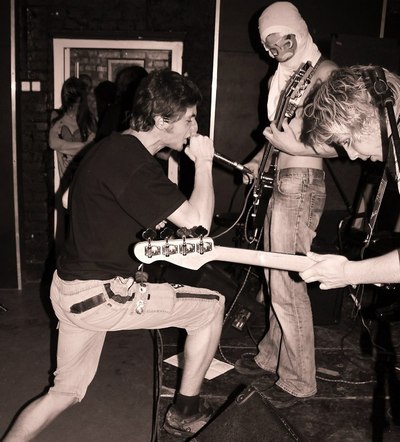

It's a grindcore/powerviolence band from Reutov, Russia, (2010-2012).
The first concert took place in April 2010 with members from Jedkij, Sakhar and Jashcher. The band did a lot of gigs and recorded 2 live demos. After that, there were two changes in the group, and an additional demo and 2 splits were released, both after the group broke up.
Membership:
Yedky - bass (2010-2011), voice
Sakhar - guitar (2010-2011)
Jashcer - drum set
Igorj - bass (2011)
Murzik - guitar (2011-2012)
Sasha Sashin - bass (2012)
22- Stomachal Corrosion (Stomaka Korodo)
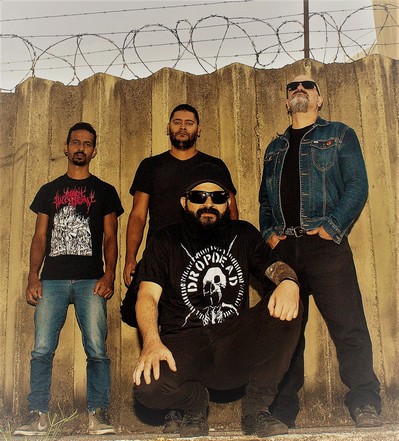
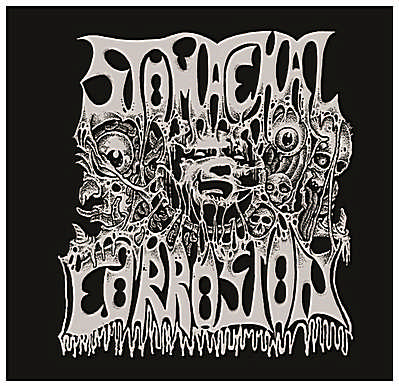
The grindcore band Stomachal Corrosion started up in January 1991. It is based in Minas Gerais in Brazil. They have often performed in various Brazilian cities.
Stomaka Korodo appears in the first volume of Esperanto Sungrunde but also in 4 other various shared CDs and compilations, and has recorded a full CD album.
After a few changes, the group has been established since 2014 with these members:
- Saul Eustachius - voice
- Charlie Curcio - guitar
- Hash Golem - bass
- Fred Catarino - drum
The phonogram "Mi ne kurbiĝu" was provided by Cogumelo Records.
O fonograma “Mi Ne Kurbiĝu” foi cedido pela gravadora Cogumelo Records.
www.facebook.com/Stomachalcorrosion
23- Tiu Ne Gravas (Es Lo De Menos)
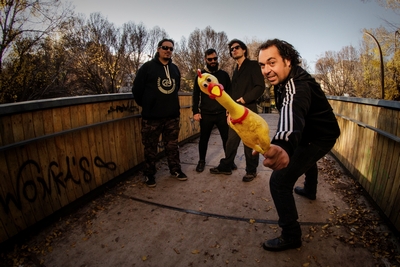
Tiu Ne Gravas (TNG) was born in January 2015.
It was formed as a Spanish-language music group, but in March of the same year the members decided to convert all their lyrics into Esperanto. At that time, Lautaro Croce translated his songs and then, in June, they recorded those new Esperanto songs.
The band's style consists of a mix of alternative rock genres such as Rock Stoner, Punk Rock and Metal Rock.
The band is based in Mendoza, Argentina and is also known as Es Lo De Menos (ELDM).
- Singer: Leonardo Visaguirre
- Guitarist: Enzo Caleri
- Bassist: Santiago Fernandez
- Drummer: Lautaro Croce
Lyrics:
- Leonardo Visaguirre
- Lautaro Croce.
To watch the music video: "Danco Nomada"
https://www.facebook.com/Eslodemenosrock
https://www.instagram.com/eslodemenosrock/
Credits and Thanks
VINILKOSMO thanks:
- All the bands, artists and technicians who contributed to the project.
- All the people who supported the project by pre-ordering the compilation.
- All the collaborators who helped and especially Cyrille Poullet, Vladimir K., Julio Calegari, Triboulet, Rikardo Cash, Angel Arquillos, Fantuz, Lisa Eriksen and the children of La Escuelita (The little school) of Lima in Peru, to whom this project is dedicated.
Assembly and management: Triboulet (studio of the Trappe, Donneville, France).
Graphics of the cover: Boj (Thomas Beaugé), Magalie Jacquet
Conception and realization of the CD booklet: Fantuz.
Abonklubo
Actively support the label and its musical production in Esperanto, the release of new albums, or the reissue of old albums.
The only alternative is that all those who wish to continue to listen to Esperanto music from the Vinilkosmo catalog in fair streaming on Music Divercities and elsewhere, subscribe to the ABONKLUBO (Subscribers Club)
It is also possible to consult the musical news of the Blog or the Vinilkosmo Newsletter.
ABONKLUBO
